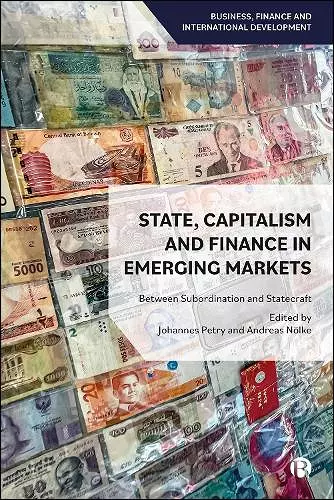State, Capitalism, and Finance in Emerging Markets
Between Subordination and Statecraft
Andreas Nölke editor Johannes Petry editor
Format:Hardback
Publisher:Bristol University Press
Publishing:24th Jun '25
£80.00
This title is due to be published on 24th June, and will be despatched as soon as possible.

What role do emerging markets play in the global financial system? Are they subordinated within global financial hierarchies? Or do they have autonomy, even power, to use finance to pursue state objectives?
In this edited volume, leading scholars explore these questions, focusing on state–finance interactions globally. The book combines literatures on international financial subordination, financial statecraft and comparative capitalism to analyse state–finance relationships in emerging markets, particularly the BRICS: Brazil, Russia, India, China, and South Africa. It reveals that these states can control their domestic financial sectors despite global subordination, though their ability to do so varies significantly.
This essential volume offers profound insights into how emerging markets are reshaping global finance for scholars and policy makers.
“State, Capitalism and Finance in Emerging Markets offers a fascinating analysis of how emerging markets navigate the global financial system. Essential for scholars and policymakers, this volume unpacks the nuanced financial strategies of the BRICS and beyond.” Oliver Stuenkel, Fundação Getulio Vargas
“With the rapid rise of emerging economies, it is vital for us to understand where they fit in the global finance and its geopolitical dynamics. This edited volume provides valuable insights into this topic by bridging theoretical discussions from both sides of the Atlantic and analyzing positions of the emerging economies between systemic subordination and unit-level agency through their financial statecraft in a nuanced context. A must read for those pondering the future of the world of finance in the 21st century.” Saori Katada, University of Southern California
“State, Capitalism and Finance in Emerging Markets is a carefully curated volume that bridges typically siloed discussions on financial and monetary policy in emerging economies. This timely contribution is particularly significant given the growing influence of emerging markets—both within and beyond the BRICS—in global economic growth and, increasingly, in international policymaking. By integrating perspectives on international financial subordination, financial statecraft, and comparative capitalism, Johannes Petry and Andreas Nölke create a dynamic intellectual space to advance these paradigms and deepens our understanding of emerging economies' agency and policy space amid global constraints.” Ewa Karwowski, Kings College London
“This volume gathers cutting-edge research on the political economy of so-called emerging markets. By combining the insights of the literatures on financial statecraft, financial subordination and comparative capitalisms, the chapters investigate the state-(international) finance nexus in countries such as Brazil, China, South Africa and more. While showing commonalities associated with “dependent” capitalism, they also stress significant institutional and policy differences that account for variegated outcomes across case studies. The overall thrust leads to a complex view that analyses state capacity and relative autonomy within a set of domestic and international constraints. A timely and original contribution to current debates about the nature and limits of policy space at the (semi)periphery of global capitalism, this book engages a stimulating conversation on how to free domestic and international finance from their neoliberal entanglements.” Ndongo Samba Sylla, International Development Economics Associates
“How and why states in emerging markets, even under conditions of subordinated positions within the global financial system, can act as strategic actors exercising control over their respective domestic financial sectors and even engage in powerful financial statecraft internationally? Dealing with this important question in an interdisciplinary, comparative and multi-level analyses, this important book is a compass for students and scholars of comparative and international political economy and public policy. It is a rich resource for those who seek to navigate varieties of state activism, and state and emerging market relations in the global financial system. The leading scholars on state capitalism provide timely and thought-provoking exploration of how and why state capacity in emerging markets matter in shaping conditions of the relationship between states and finance at domestic and international levels.” Caner Bakir, Koc University
ISBN: 9781529243345
Dimensions: unknown
Weight: unknown
272 pages